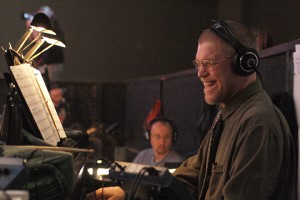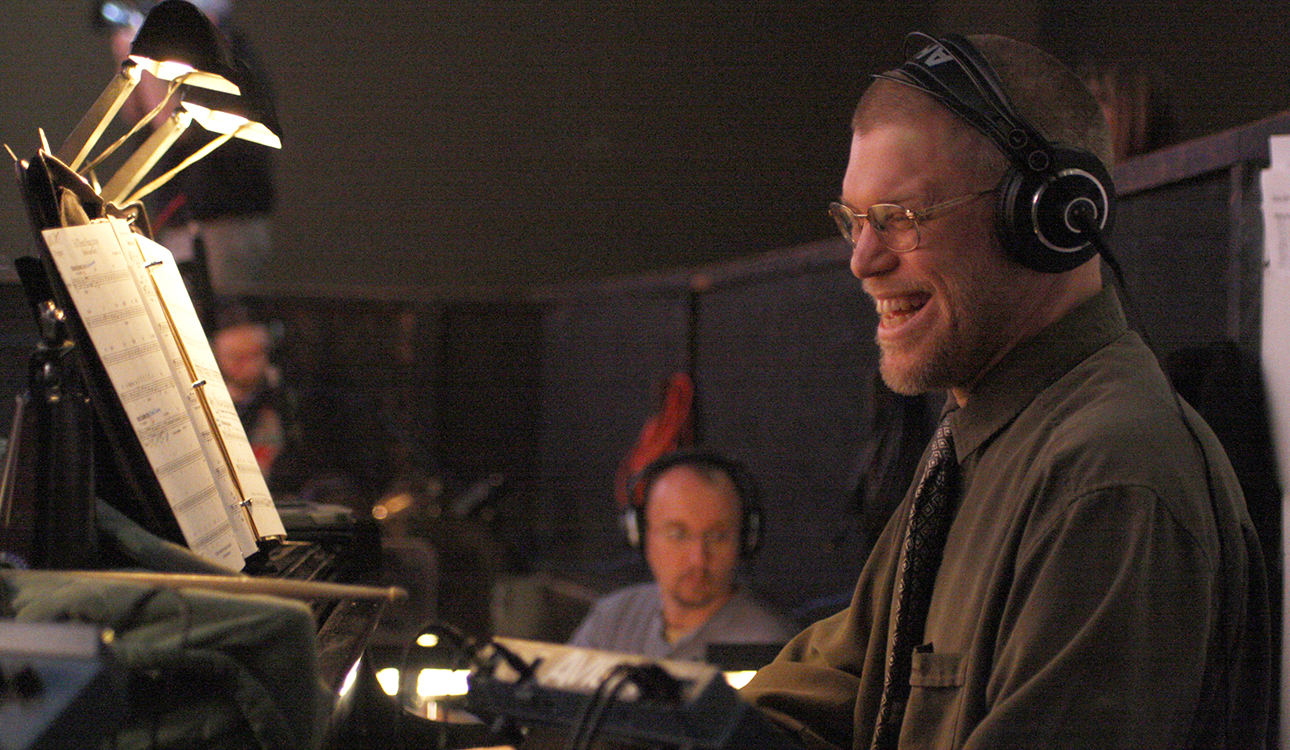
By Madison Adams
Reporter
As the music arranger for all the acts involved in All-University Sing for 23 years, alumnus Jason Young has put in countless hours into more than 450 acts to ensure that each group has every opportunity to qualify for Pigskin Revue each year.
In the midst of the Sing season, it was only fitting that the Lariat interview the man behind the music to see the perspective of Sing from down in the pit.
Q: What is your role in Sing?
A: I don’t work directly for Baylor. I am actually hired by the student groups to arrange all the music that goes into their respective acts. Cheryl Mathis, the associate director of student activities, steers the boat and organizes everyone and everything on the directing side of things.
People always talk about the music but the reality is that there are so many people working on so many different aspects of the show. Choreography, set design, backdrop, costumes.
Cheryl, her graduate assistant Sarah Pullin, along with Student Productions, all work for months to get Sing to the stage. Because I sit in the pit, it’s easy to think that I’m more important than any of them. I’m not. It’s a team effort and we all pull together.
Q: How did you move into the position?
A: When I came in ’87 as a student, I was part of a work-study program where they basically picked a job out of a hat for me and it said ‘Waco Hall.’ Specifically, my job was running the audio mixer in the pit for this thing called “Pigskin Revue.”
A few years later, Janey Hampton, who was Sing chair for Zeta Tau Alpha, asked me to compose the music for their act, which was a fireman theme.
Q: Did you know what you were getting yourself into?
A: Obviously not. It has changed my life and I love what I do. The best job I ever had was as wilderness guide in Colorado during my college years, but this is a close second.
When I was just a college student running audio in the pit, I had the reaction of, “this is amazing,” and then four years later when asked to compose for Zeta, it took me 300 hours to write the first act. I didn’t have a computer or anything and I even went $2,000 in debt when I co-signed a loan with my dad to make arranging my first Sing act all possible.
Now it probably takes me around 100 hours per act to put it all together, but it’s one of those things when you find your calling you don’t think about the hours you are putting in, you think about the fact that you were made to do this. I truly consider myself blessed to be where I am today.
Q: What surprised you about the position?
A: How disorganized the role of the arranger was before I came. There was no standardization or organization behind what an arranger did. Some people had paper scores and some scores were computerized. The groups would also hire their own bands, which meant as the acts would be tearing down and setting up on stage the bands would be changing out down in the pit. The sound levels would be all off, the band would be scrambling and the show suffered.
Q: What does the process look like now?
A: Now the band is given their entire music for the acts, which amounts to roughly 450 pages of music. They learn the music in two days and then run through the music only six times before club night.
So for instance the Saturday before Sing we will have eight hours of rehearsing, each act receiving 45 minutes, which amounts to running the act twice.
Then Monday each act gets a full-tech where they run the act three times with band. On Wednesday, the acts get dress rehearsal. Then Thursday for club night is the seventh time we as a band have played the act.
Q: What does a day in the life of Jason Young look like?
A: Well I do not think people realize how long it takes to put the show together. Once the music arranging part starts, I spend many hours talking with the groups, writing music, thinking through different ideas and generally trying to develop the best way to present the act.
I’ll get up at 4 a.m. sometimes (but then I’m a chronic insomniac, which can sometimes be beneficial) and work all day.
There’s a stretch of about 100 days where I’m working seven days a week, up to 10 hours per day to get the bulk of the music done.
Once the music is delivered and approved, I’ll turn around and create the sheet music for each act as well as the individual parts, master scores and show track.
Q: What is a challenge that people might not be aware of?
A: Keeping it fresh from year to year. The themes go into embargo and cannot be used for six years if the act goes to Pigskin or four years if the act did not qualify for Pigskin and we cannot do anything on that list or anything even related. Every year I find myself thinking, “So what do we do next year?” This is such a creative endeavor and you have four to five Sing chairs with different ideas and sometimes getting them on the same page is something that is also challenging. It is fun to take students through this process, helping them to develop their act, keep it professional, keep quality high and keep the audience entertained. I try to have them think about Sing as Broadway on a budget. This is not a high school show amped up.
Q: What makes it worth all of the work?
A: To me, Club Night is Christmas. Students and everyone involved has spent nine months working on their act and the curtain goes up and groups finally get to present their present. Another aspect I love is seeing leadership development happen. Seeing students transition from thinking, “how are we going to do this?” to being proud of an act that they have constructed. Sing is a learning lab and every year I have alumni come back and say I learned many lessons through Sing that I never would have learned from class.
Q: What is the funniest thing you have ever seen happen when the acts go live opening night?
A: One time the band and I figured out we have witnessed over 5,000 performances of individual shows. Hilarious things are bound to happen.
One that sticks out was in 2006 or 2007 when Alpha Tau Omega did a Sesame Street act and they were late getting their costumes done so last minute they glued big eyeballs onto their Cookie Monster outfit. When Cookie Monster busted through their paper backdrop, one of the big eyeballs came unglued and rolled across stage and into the pit during club night, leaving the entire audience in hysterics.
Q: Biggest catastrophe you’ve seen over the years?
A: The biggest was when we set the stage curtain on fire. It was Chamber’s baseball act from around 1995. It was supposed to be much like the end of the movie “The Natural” when the character Hobbs hits the ball into the stadium lights and they explode. When the lights exploded on stage, it somehow set the curtain on fire and the stage manager came out and hosed down the curtain with a fire extinguisher while Chamber finished their act, singing “Take Me Out to the Ball Game.”
Q: Do you expect the acts to be better than ever in Sing 2014?
A: I think they will be. There have always been great acts, but the acts that used to place first, second and third years ago might make Pigskin these days but they probably would not place in the top three.
In the last 10 years, you have seen shows like “American Idol” and “So You Think You Can Dance” that give you behind-the-scenes look at how productions work, which makes many aspects of a production become part of our daily vocabulary. Students become Sing chairs and already somewhat speak the language so instead of starting out in Sing 101, they start with Sing 201.
Q: Any acts that break the mold?
A: You could never completely re-do Sing. Sing is its own thing and it has its own language. It isn’t a musical and it isn’t a choir concert. If you do something that is totally different, the audience won’t understand it.
The audience comes in and they expect to be spoken to in the language of Sing. To break the mold would be like talking in the audience in the wrong language. No matter how different the acts are, they still have a family resemblance. If we do the act right the audience should think it’s effortless, funny, entertaining and easy.






